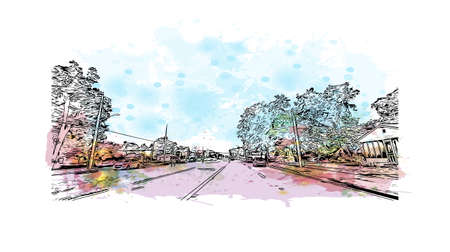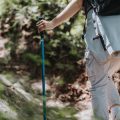1. Discovering Nebraska’s Prairie Heritage
Nebraska’s prairies stretch across the heart of the Great Plains, offering a unique landscape that tells the story of America’s past and present. These vast grasslands once covered millions of acres and served as both home and highway for Native American tribes, pioneering settlers, and countless species of wildlife. Today, hiking along Nebraska’s prairie trails gives you a chance to step back in time and experience the natural beauty and cultural richness that shaped the nation.
The Natural Beauty of Nebraska’s Prairies
The prairies are more than just open spaces; they are vibrant ecosystems filled with tall grasses, wildflowers, birds, and bison. The rolling hills and wide skies give hikers panoramic views that change with every season. From spring blooms to golden autumn grasses, each hike offers a new perspective on this iconic American landscape.
Key Features of Nebraska’s Prairie Trails
| Feature | Description |
|---|---|
| Tallgrass Prairie | Home to big bluestem and switchgrass, these areas represent some of the most fertile soil in the country. |
| Wildlife Viewing | Spot deer, prairie chickens, foxes, and even bison along many trails. |
| Historical Landmarks | Many trails pass by old wagon tracks from the Oregon Trail and sites important to Native American history. |
| Expansive Views | Open horizons make for dramatic sunrises and sunsets—perfect for photography or quiet reflection. |
The Cultural Significance of the Great Plains
Nebraska’s prairies are woven into the fabric of American history. Indigenous peoples such as the Pawnee and Omaha called these grasslands home long before European settlers arrived. Later, pioneers crossed these plains in search of new opportunities, leaving behind stories that are still remembered today. Hiking here is not just about enjoying nature—it’s about connecting with generations who traveled these same paths.
2. Top Hiking Trails Across the Great Plains
Nebraska’s prairies are a hidden gem for hikers looking to experience the wide-open beauty of America’s heartland. From rolling grasslands to dramatic bluffs, these trails offer something for everyone. Here’s a look at some of the most popular and scenic prairie hiking trails in Nebraska, each with their own unique local flavor.
Popular Prairie Trails in Nebraska
| Trail Name | Location | Mileage | Unique Features |
|---|---|---|---|
| Ponca State Park Trails | Northeast Nebraska | 22+ miles (various loops) | Views of Missouri River bluffs, dense woodlands, wild turkeys and deer |
| Indian Cave State Park Trail System | Southeast Nebraska | 20+ miles (network) | Historic petroglyphs, hardwood forests, sweeping river views, spring wildflowers |
| Cowboy Trail | Across Northern Nebraska | 195 miles (select sections) | Converted rail-trail, bridges over creeks, wild prairie vistas, family-friendly biking and hiking |
| Chadron State Park Trails | Northwest Nebraska (Pine Ridge) | 18+ miles (various loops) | Pine forests meet prairie grasslands, scenic overlooks, wildlife spotting |
| Homestead National Historical Park Trail | Southeast Nebraska near Beatrice | 3 miles (loop) | Tallgrass prairie restoration, history exhibits, birdwatching opportunities |
| Pioneer’s Park Nature Center Trails | Lincoln, NE | 8+ miles (network) | Bison viewing area, easy-to-navigate trails, educational signs about prairie ecology |
Local Favorites and Unique Features
Ponca State Park: The Bluff Trail Experience
Ponca State Park is a local favorite for its panoramic views from the bluffs high above the Missouri River. Hikers often spot bald eagles soaring overhead or catch glimpses of deer along the wooded paths. The Overlook Trail is especially popular in autumn when the leaves change color.
Cowboy Trail: Long-Distance Prairie Adventure
If you’re up for a bigger adventure, the Cowboy Trail is one of America’s longest rails-to-trails conversions. You don’t need to hike all 195 miles—many locals choose short stretches near towns like Valentine or Norfolk to enjoy prairie sunsets and cross picturesque bridges.
Pioneer’s Park Nature Center: Family-Friendly Exploration
This spot in Lincoln is perfect for families or beginner hikers. The well-marked trails wind through tallgrass prairie, wetlands, and even a bison pasture! There are plenty of benches and nature displays along the way.
What Makes Nebraska’s Prairie Trails Special?
Nebraska’s hiking trails aren’t just about getting from point A to B—they’re about connecting with nature and discovering the unique rhythm of life on the Great Plains. From sunrise walks among wildflowers to sunset vistas across golden fields, each trail offers its own slice of classic Americana.

3. Wildlife and Native Flora Encounters
Nebraska’s prairie trails offer hikers a front-row seat to the state’s diverse wildlife and unique plant life. As you make your way along the Great Plains, keep your eyes open for the animals and wildflowers that define this region’s character. Here’s what you might spot out on the trail:
Wildlife on the Prairie
The open grasslands and gently rolling hills of Nebraska provide a home for many different animal species. While hiking, you may come across some of these fascinating creatures:
| Animal | Where to Spot | Interesting Fact |
|---|---|---|
| White-tailed Deer | Wooded areas and near streams | Known for their distinctive tail flip when startled |
| Prairie Dog | Open prairies with burrows | Live in large colonies called “towns” |
| Western Meadowlark | Tall grasses and fence posts | Nebraska’s state bird, famous for its melodic song |
| Bison (American Buffalo) | State parks and protected reserves | Once nearly extinct, now making a comeback in managed herds |
| Coyote | Throughout prairies, especially at dawn or dusk | Coyotes are clever hunters and often heard howling at night |
| Red Fox | Edge of woodlands and grasslands | Known for their bushy tails and quick movements |
Native Wildflowers to Look For
Nebraska’s prairies burst with color from spring through late summer. The wildflowers here are not just beautiful—they’re also important to the ecosystem, supporting pollinators like bees and butterflies.
| Wildflower Name | Blooming Season | Description/Color | Fun Fact |
|---|---|---|---|
| Purple Coneflower (Echinacea) | June–August | Purple petals with spiky brown centers | A favorite for both butterflies and herbalists alike! |
| Prairie Blazing Star (Liatris) | July–September | Tall spikes of fuzzy purple flowers | This flower is a magnet for monarch butterflies. |
| Sunflower (Helianthus) | August–September | Large yellow blooms facing the sun | Nebraska’s official state flower—fields look golden in late summer. |
| Blue Grama Grass Flowering Heads | June–August | C-shaped seed heads waving above short grasses | This native grass is key to prairie restoration projects. |
| Bluestem (Big & Little) | July–October | Bluish-green stems turning reddish-bronze in fall | Mainstay grass of Nebraska prairies, essential for wildlife habitat. |
Tips for Spotting Wildlife and Flowers Safely
- Walk quietly to avoid startling animals.
- Bring binoculars for birdwatching or spotting shy mammals from a distance.
- Please don’t pick wildflowers—leave them for others to enjoy and for pollinators to use.
- If you encounter bison or deer, give them plenty of space—wildlife always comes first!
Nebraska’s Distinct Ecosystem
The Great Plains ecosystem is one-of-a-kind, shaped by centuries of wind, fire, and grazing animals. From the flutter of meadowlarks to the sway of bluestem grasses, every step along Nebraska’s prairie trails brings you closer to understanding this remarkable landscape. Whether you’re an avid birder, a budding botanist, or just love being outdoors, there’s something special waiting around every bend in Nebraska’s wild prairies.
4. Planning Your Great Plains Adventure
Getting Ready for the Prairie Trails
Nebraska’s prairie trails offer wide-open spaces, big skies, and a hiking experience like no other. Before you lace up your boots, some smart planning will make sure you have a safe and fun adventure out on the Great Plains.
What to Pack for Nebraska’s Prairie Hikes
| Essential Gear | Why You Need It |
|---|---|
| Sturdy Hiking Shoes or Boots | Prairie trails can be uneven or muddy—good footwear keeps you comfortable and safe. |
| Lightweight Backpack | Carries all your supplies without weighing you down. |
| Water Bottle or Hydration Pack | Nebraska sun can be intense—staying hydrated is key. |
| Sunscreen & Hat | There’s little shade on the plains; protect yourself from sunburn. |
| Bug Spray | Mosquitoes and ticks are common in grassy areas. |
| Trail Map or GPS App | Prairie landscapes can look similar—don’t get lost! |
| Weather-Appropriate Clothing (layers recommended) | The weather changes quickly—be ready for sun, wind, or even a sudden storm. |
| Snacks (like trail mix or granola bars) | You’ll need energy for those long, open stretches. |
| First Aid Kit | A small kit can handle minor scrapes or blisters. |
| Camera or Binoculars (optional) | The wildlife and sweeping views are worth capturing! |
Prairie Trail Etiquette: Do’s and Don’ts
- Leave No Trace: Always pack out what you bring in. Trash—even biodegradable items—can harm local wildlife.
- Stay on Marked Trails: Protect native grasses and avoid getting lost by sticking to established paths.
- Respect Wildlife: Observe animals from a distance. Don’t try to feed them or approach nests/burrows.
- Yield to Others: Step aside for horseback riders or faster hikers when needed, and say a friendly “hello!” as you pass fellow adventurers—a classic Midwestern custom.
Navigating Nebraska Weather Like a Pro
The weather on the Great Plains is famously unpredictable. Here’s how to stay prepared:
| Weather Condition | How to Prepare/React |
|---|---|
| Hot & Sunny | Wear light-colored clothing, apply sunscreen often, take breaks in any available shade, and drink water regularly. |
| Windy Days | A windbreaker helps a lot. Secure hats and keep loose items tucked away so they don’t blow off into the prairie grass. |
| Sudden Rainstorms | Packing a lightweight rain jacket is wise. If thunder rumbles, seek shelter immediately—avoid open fields and high ground until it passes. |
| Crisp Mornings & Evenings | Dress in layers that you can add or remove as temperatures change throughout your hike. |
| Tornado Watches/Warnings (spring/summer) | If severe weather is forecasted, postpone your hike. Safety comes first! |
Your Prairie Adventure Awaits!
A little preparation goes a long way when exploring Nebraska’s wild heartland. With these tips in mind, you’ll be ready to soak up every bit of beauty—and tackle whatever the Great Plains throws your way!
5. Local Communities and Prairie Conservation
Nebraska’s prairies are more than just open landscapes—they’re the heart of many small towns and rural communities. Locals have a deep connection to these grasslands, whether through ranching, family traditions, or outdoor recreation like hiking along the Prairie Trails. The relationship between people and prairies is woven into daily life in Nebraska, with community festivals, local history stories, and volunteer days dedicated to preserving this unique environment.
The Role of Communities in Prairie Stewardship
Many Nebraska towns work hand-in-hand with conservation groups and state agencies to keep prairie ecosystems healthy. This teamwork shows up in projects such as:
| Community Effort | Description |
|---|---|
| Prairie Restoration Days | Volunteers gather to plant native grasses and remove invasive species. |
| Educational Programs | Local schools partner with parks for field trips and hands-on learning. |
| Wildlife Monitoring | Residents help track bird migrations and monitor pollinator habitats. |
| Trail Maintenance Crews | Hikers and neighbors join forces to maintain safe, scenic trails. |
Conservation Efforts Across the Great Plains
Pioneering Nebraskans know that protecting the prairie is vital for future generations. Conservation organizations work on several fronts:
- Land Trusts: These groups purchase or secure easements on important prairie parcels, keeping them safe from development.
- Controlled Burns: Managed fires help restore balance by encouraging native plants to thrive.
- Prairie Preserves: Public lands like the Spring Creek Prairie Audubon Center offer hiking trails where visitors can experience tallgrass beauty up close.
- Pollinator Projects: Efforts to plant milkweed and wildflowers support the Monarch butterfly migration each summer.
The Impact on Local Life
Prairie conservation brings Nebraskans together. Farmers learn new soil health practices; young hikers discover wildlife tracks; local businesses welcome eco-tourists drawn by the wide-open spaces. By working as stewards of the land, Nebraska’s communities are ensuring these iconic grasslands remain vibrant for years to come—making every hike along the Prairie Trails an adventure into both nature and heritage.


